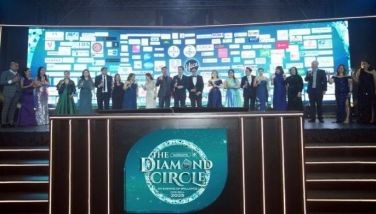The best films of 2005
January 6, 2006 | 12:00am
 Let’s skip talk of the disastrous box-office slump and focus on the pertinent: 2005 was one hell of a year in film, full of gay cowboys, a mighty ape and politics, politics, politics. Agendas were abundant – some subtle, others worn on their film’s sleeve – and ranging from Syriana’s criticism of American oil companies in the Middle East to Good Night, and Good Luck’s attack on McCarthyism to Munich’s take on counter-terrorism after the Olympic murders. Per usual, one stood out as the best; not only was it perfectly made, but was also groundbreaking and important. This could not be said for the worst film of the year, which opted for a more insipid approach.
Let’s skip talk of the disastrous box-office slump and focus on the pertinent: 2005 was one hell of a year in film, full of gay cowboys, a mighty ape and politics, politics, politics. Agendas were abundant – some subtle, others worn on their film’s sleeve – and ranging from Syriana’s criticism of American oil companies in the Middle East to Good Night, and Good Luck’s attack on McCarthyism to Munich’s take on counter-terrorism after the Olympic murders. Per usual, one stood out as the best; not only was it perfectly made, but was also groundbreaking and important. This could not be said for the worst film of the year, which opted for a more insipid approach.
Here is my list of the best and worst films released in the United States in 2005.
2. Me and You and Everyone We Know – Miranda July’s astonishing debut is deliciously perverse, outlandish, offbeat, but wholeheartedly true. More than a meditation, Me and You and Everyone We Know is a simple yet penetrating statement on the complexities of human connection in the 21st century, portraying the desperation, the sadness, the ridiculousness, the delicacy, the exhilaration of the need for communication. By intertwining the lives of a number of ordinary Everybodies in unnamed Anywhere, USA, writer-director-actress July crafts the most quietly revelatory film of 2005; simultaneously hysterical, wrenching, terrifying, life-affirming and uplifting. She is one of the most original voices of our time, and yet everything she presents is already right before our eyes. People are all around us, she says, and yet we cannot learn to acknowledge them, learn from them, communicate with them; we need people to survive, find solace, hope, beauty, love in, yet we are lost from them. Miranda July is an artist, an auteur, in every single sense of the word, and Me and You and Everyone We Know is the rare film that fulfills the capabilities and functions of art to define impressionistic human existentialism. Learn from it, be enthralled, but be warned: you’ll never see the world the same way again.
3. King Kong – In a time when remakes almost always prove pointless and the blockbuster loses its ability to amaze, Peter Jackson creates an overtly lavish celebration of cinematic commercialization with his $200 million ode to the 1933 classic. He puts that chunk of change to good use, having a blast in the way he could not with the Lord of the Rings trilogy: by utilizing the most impressive digital effects technology available today, Jackson not just walks the line between what is necessary and what is vulgarly extravagant, but toys with it, setting a new standard for the tentpole blockbuster. King Kong though would not work if not for the beating heart within the giant ape: Andy Serkis, evidently tired of the horribly overdone catchphrase he had written into pop culture history as You-Know-Who, dons another motion-capture suit as the titular Kong, giving a deeply moving performance most live-action actors working today could not achieve. And as in the original Kong, Ann Darrow is the epic’s true star: Naomi Watts transcends the basic two-dimensional plaything of Fay Wray’s Ann to become a woman truly in love with a beast in the most luminous, most tender, most poignant way possible; this is the best female performance of the year. (Yep, I said it. No, it isn’t Felicity’s, nor is it Reese’s.) King Kong is an extraordinary feat of epic filmmaking; with today’s audience so exhausted with what they see on screen, it is rare for a film of this kind to shock and surprise with its visuals. Jackson does it with wide-eyed glee, like a fanboy holding a rare King Kong collectible toy, resulting in a movie that is so shameless with its excessive, overindulgent ambitions that you can’t help but smile along with him; that is, before you pull out the Kleenex.
4. Caché (Hidden) – Once in a while, there comes a film that, totally out of nowhere, takes out a knife and slices it through your throat, enjoying the sadistic pleasure of watching you then squirm on the floor as you drown in your own pool of blood (to those who have seen this flat-out brilliant French thriller, you know what I mean). Starring Daniel Auteuil and Juliette Binoche as a married couple harassed by a mysterious stalker, Caché is a film that is as disturbing as it is downright genius. Writer-director Michael Haneke, in his best work that trumps even 2002’s The Piano Teacher, speaks the cinematic language of Hitchcock: shots are alternately long, disorienting, frustrating and tight-rope tense, with homages to everything from Rear Window to Vertigo. No film this year is as psychologically literate, employing the style of Hitchcock and the substance of Lynch; this is a thriller Hollywood can only dream of crafting, one that terrorizes the brain before tearing it out of your skull with its jaw-dropping final shot. Fifteen minutes after the credits started rolling in the Manhattan cinema I saw Caché at, the room had still not emptied, people still in their seats talking about what exactly they had witnessed. A week later, it still lingers in my head.
5. The Squid and the Whale – Humor is abundant in Noah Baumbach’s razor-sharp observation of divorce and the poor pretentious fools that suffer it, though when you laugh, it often hurts. Baumbach approaches the topic of a family being torn apart with a no-holds-barred cruelty, but what is most excruciating to watch is how much of it rings true. Jeff Daniels gives a career-best performance as the painfully hilarious father, as does Jesse Eigenberg, as his deluded son full of admiration. Laura Linney and Owen Kline round up one of the year’s strongest ensembles. No doubt The Squid and the Whale succeeds because of its searing autobiographical honesty: in perfectly capturing a decade and a city through the eyes of one family, Baumbach’s wistful yet never nostalgic fourth feature expands a personal domestic tragedy of 1986 on all directions, way across the canvas.
6. Good Night, and Good Luck – Director George Clooney, who also co-wrote the screenplay with Grant Heslov, treats Edward R. Murrow’s famed final four words for every episode of his 1950s CBS newsmagazine See It Now as a wish for a "happily ever after." Rightfully enough, Good Night, and Good Luck plays out like a fairytale of sorts, of a man who honored truthful and objective journalism for a greater good during a dark time of American history. Lefty politics aside, this black-and-white time-capsule tour de force about Murrow’s televised conflicts with Senator Joseph McCarthy is a striking tribute: in a brisk 93 minutes, Clooney makes a determinedly compelling case to why this man must be celebrated, for his audacity, his fearlessness, and his unrelenting suaveness. David Strathairn molds Murrow into a dashing debonair, a connoisseur of charm and thrillingly elegant sophistication; the film, in most ways, is the same. Stylish and smart, Good Night, and Good Luck is, to paraphrase the Peabody Awards’ praise for See It Now, a simple, lucid, intelligent analysis of an era and an industry, using a strikingly effective format for presenting its issue and the personalities involved with humor, sometimes with indignation, and always with careful thought.
7. Pride & Prejudice – Never has Jane Austen been this sexy and delicious than in the year’s finest, most spirited romantic comedy. This millionth adaptation of the author’s greatest novel (also check out Gurinder Chadha’s exuberant Bollywood musical Bride & Prejudice) is the best ever to be put to film, upping even the beloved 1995 BBC miniseries. The first to forgo literal-mindedness and the blatant antifeminism of past adaptations, Pride & Prejudice, with a screenplay by Deborah Moggach, acknowledges the tinges of Austen’s comic irony and wit, unafraid to be contemporary, mischievous, realistic, satiric and gritty in separate doses. Director Joe Wright is playful with his editing of the book, and Keira Knightley, in a surprisingly glowing performance as the famed Elizabeth Bennet, fleshes out a feistier, fresher version of the heroine we’ve all come to know. It is rare that a costume period piece is this much fun, and this grounded in the present; even less frequent is a film that stays true to the all-too-oft misinterpreted ideals of its source material.
8. A History of Violence – This is a blow to the face, then a gunshot to the heart. A History of Violence is a classic American tragedy, and an homage to classic American cinema. Simultaneously a Western, a noir thriller, a quiet domestic drama and a sensitive fable, David Cronenberg tackles themes of violence, lust and family with a vicious eye for gratuitous violence and sex. But this is where he turns his best film yet into a critical social experiment: we find humor and entertainment in the violence and sex presented, and he doesn’t let us get away with it. Oftentimes over-the-top and startling, Cronenberg seduces us with carnal pleasures before having it blow up in our faces, crossing the border into horribly horrific visual masochism. Viggo Mortensen, and Maria Bello especially, give top-notch performances, and by the time William Hurt cameos, it’s like the bloody icing on the sick burnt cake.
9. Capote — Capote is what I wanted Sylvia to be; not in a long while has a film so eloquently and poetically illustrated the method of an artistic genius like Bennett Miller’s feature debut, about the road that led Truman Capote to write his opus In Cold Blood, ushering in the genre of the non-fiction novel. Frankly, the film is Philip Seymour Hoffman, who doesn’t play Capote as much as become him: That voice, those mannerisms, that transcendent humanity; going beyond mere impersonation, Hoffman’s investment into the role defies the ability of description. Yet the screenplay from actor-turned-writer Dan Futterman further elevates Hoffman’s performance, unafraid to show the ruthless, gentle, clever, flamboyant, and benevolent inner workings of one of America’s greatest authors of the indulgent glitterati.
10. Munich – With enough expertly choreographed set pieces to induce anxiety attacks, Steven Spielberg’s Munich is one hell of a great thriller. But a politically charged examination of modern terrorism and the Israeli-Palestinian conflict? Not quite. While Spielberg is able to impartially confront and present an issue nowhere near balanced, he restrains from taking a strong stance, neither answering questions nor raising any new ones. He is, though, able to paint a disturbing image of the psychological consequences of violence and vengeance, using Eric Bana’s Avner, an operative hired to assassinate those involved in the murder of 11 Israeli athletes during the 1972 Munich Olympics, as a guinea pig for a distressed conscience. Sweeping through Europe with a tightly concentrated sense of hypnotic tension, the film is manic and artful in the way only a Steven Spielberg film could be; his best since Minority Report.
BrandSpace Articles
<
>
















